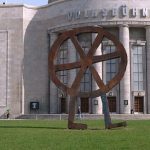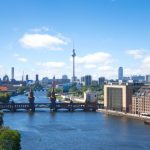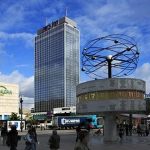 Separated from his student tour group in East Berlin, a much younger John M. Edwards gets seriously lost and says, “Ich bin ein Berliner!” (I am a doughnut!), but, er, for exactly how long? It’s a race against time to find “Chuck” and bust through the border crossing before the “Iron Curtain” closes. . . .
Separated from his student tour group in East Berlin, a much younger John M. Edwards gets seriously lost and says, “Ich bin ein Berliner!” (I am a doughnut!), but, er, for exactly how long? It’s a race against time to find “Chuck” and bust through the border crossing before the “Iron Curtain” closes. . . .
For numerology fans, both the first Mayflower landing at Plymouth Rock and the dramatic fall of the Berlin Wall fell on my birthday: November 9:
The first, a demarcation for a finish line of freedom; the second, an articial dividing line separating a people. Both purportedly could be seen from space, perhaps by passing chariots of the gods and more recently through the evil eyes of satellites, before they were chipped down for souvenirs and sold off in boxes.
A long time ago, I was on a student tour group going through Europe and at last had a chance to see the graffiti-covered Berlin Wall, famous for an inconvenient airlift and a presidential misspeak. In a famous speech, JFK said, “Ich bin ein Berliner” (I am a doughnut), when in fact he meant, “Ich bin Berliner” ( I am from Berlin). Which he wasn’t really.
When I breezed through “Checkpoint Charlie” into East Berlin, after presenting a clever bribe of a capitalist can of Coke (TM) to speed the way past the passport and visa check, I somehow got separated from my friends who wandered off in nervous cliques, leaving me utterly alone on a wide showpiece boulevard with crumbling bombed-out buildings somewhere near the brooding Brandenberg Gate.
Since I was a Mayflower descendant directly related to William Bradford, with some Kraut ancestry in me, including several famous German Methodist preachers, I felt both a curious thrill and drop of dread to be in one of my home countries–and a little alienated to be sightseeing alone, nervous as a potential defector, in a Cold War communist demesne straight out of a Ludlum suspense novel.
Most of the nonplussed people with pleasant faces I passed on the street seemed to naturally assume I was German, too, since I had dressed down for the excursion.
Only my expensive Rockport walking shoes gave up a ghost of a clue pegging me as a Western tourist, which East Berliners might possibly assume was a gift from relatives in West Berlin, or evidence I was a member of the communist elite: needless to say, the rubber soles of my moon shoes flapped on the cobbles like cold snaps.
I entered an enormous department store filled with rows upon rows of exactly identical goods, ready to be “sold” to men and women looking like Goodwill victims in drab threadbare suits and joyless frumpy dresses by the unfathomably complex socialist distribution system, usually involving legendarily long lines.
Despite our misconceptions about communism, with its unrealistic quotas to fill and its five-year plans, the goods certainly were not free, and with the artificial exchange rate for foreigners they were still prohibitively expensive even for rich Americans..
Nevertheless, when I entered a space-age cafeteria and ordered “chicken soup,” it came in a large bowl of broth with—believe it or not–a whole damn entire chicken in it!
I felt lost in a Gothic ghost story and like crying.
But then I stopped at a Bierstube (beer bank) with “al fresco” amenities (that’s fancy talk for “open air”) and started talking to two other travelers from Holland who wore bright colors and smiled a lot: in the back of my mind I wondered if they might just be pretending to be travelers from Holland who wore bright colors and smiled a lot.
Dig?
These cool-ass-hipster Netherlanders could at least steer me in the right direction towards Checkpoint Charlie so I could burst through the border before last call, and they were clearly impressed and even clapped politely when I proved I knew the correct pronunciation of “Gouda” cheese (“Houda”).
Instead, I found myself drinking endless shots of Heffe-Weissen (wheat beer) and growing mighty gloomy, as a burly German waiter with a starched white apron talked volubly to us, emphasizing with some romanticism, according to my Dutch Masters, how much he liked Dutch people, that they were just like Germans.
But then out of the warped Weltanschaung of Die Welt, the German mentioned he did not like Americans much and that the United States was the most dangerous country on earth, speaking with what looked like conviction, and, in an exceedingly loud voice. . . .
I pretended to be Dutch and kept my mouth shut.
Hence, it was high time to depart: otherwise, if I didn’t make it back through the checkpoint in time, I imagined I might not ever leave.
After that, all I remembered was wandering in a drunken somnambulant daze, like the sleepwalker Conrad Veight from the silent scream of German Expressionism The Cabinet of Doctor Caligari, in the underground subway system, where my eye landed like a holy superhero upon a clever propaganda poster: “Superman” in his usual red, white, and blue leotards and cape, with a missile for a head and a dollar-sign $ emblazoned on his chest.
I took it as a compliment:, kinda: here was Nietzsche’s “Ubermensch” (Overman) dressed up in camp polyester duds, working undercover for the United States of America, not the so-called DDR (Deutsche Democratic Republic).
Perhaps there is a secret Stasi file hidden in a shoebox somewhere about how a German-American gentleman and scholar from Tulane University finally made it back on his own steam by some circuitous route that night to his West Berlin boutique hotel on the other side of “The Wall”–without going back through “Chuck”!
I dunno, what do you reckon?
When I finally return to Berlin, cured of the sniffles after the Cold War, less about propaganda and more about penicillin, I’m sure I’ll find the place to be completely different. . . .





Leave a Reply